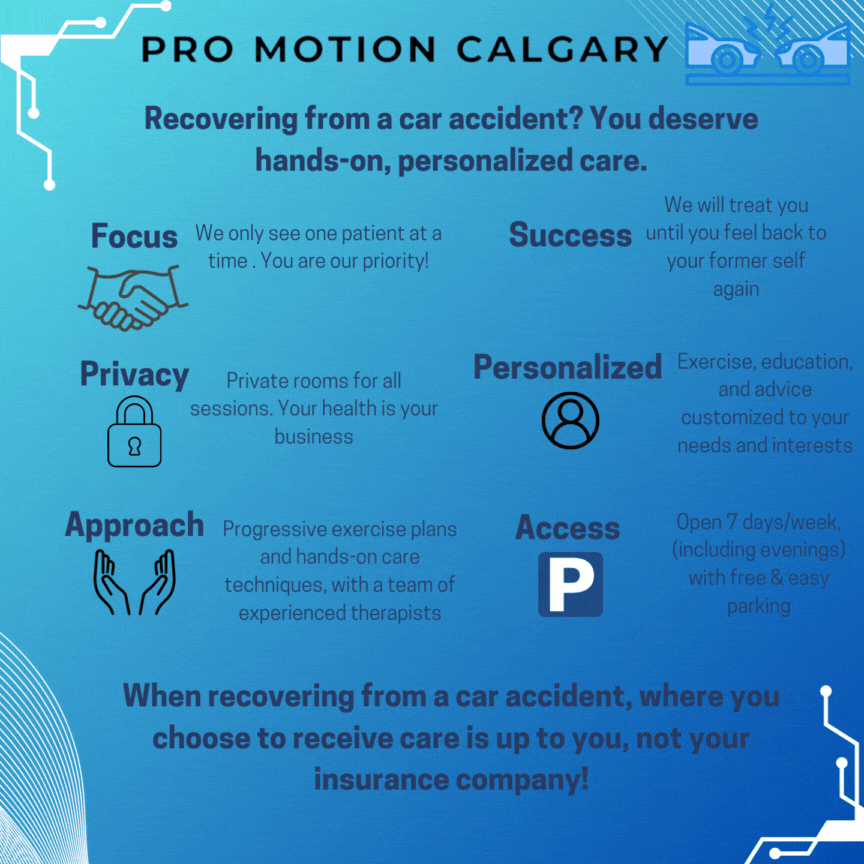Complete Care for Motor Vehicle Accidents (MVAs) at Pro Motion Calgary
We understand that getting in a car accident (or being a passenger in one) is extremely stressful. Once the dust settles, your first call should be to your insurance company. Once you have reported the accident and any injuries, you can call our team right away to get booked in for an MVA Initial Assessment with one of our Physiotherapists or Chiropractors. You will then be asked to fill out and complete the AB-1 Proof of Loss Form, which us or your insurance company can provide you. Now you can relax and let us take care of the rest while you focus on your treatments and exercises to get back to 100%. If you require additional services, like acupuncture or massage therapy, we have a full team in house. If you require psychological care, we have close contacts to assist with that also!
Injuries from an MVA can vary from:
Whiplash: Whiplash is a common injury that occurs when the head is suddenly jerked forward and then snapped backward.
Back and Spinal Injuries: Motor vehicle accidents can result in back injuries such as sprains, strains, herniated discs, or fractures.
Soft Tissue Injuries: The impact of an accident can cause damage to soft tissues like muscles, tendons, and ligaments.
Bone Fractures: The force of a collision can lead to fractures or breaks in bones, such as the arms, legs, ribs, or pelvis.
Psychological Impact: Motor vehicle accidents can also result in psychological distress, including post-traumatic stress disorder (PTSD), anxiety, and depression.
What Services Are Allowed?
Physiotherapy (Primary Practitioner)
Chiropractic (Primary Practitioner)
Massage Therapy
Acupuncture
Psychology
Treatment and Recovery Process
Your initial assessment must be completed by a Physiotherapist OR Chiropractor. During your initial assessment your primary' practitioners main goal is to identify any and all areas of your body that have been injured in the car accident. They will do this by doing an in depth health history, movement based assessments, strength assessments, nerve exams, and more. Following the initial assessment, your Physiotherapist OR Chiropractor will create a personalized treatment plan for you which could include a combination of exercises, other therapies (massage, acupuncture, etc), bracing, and more.
In most cases you will be approved for treatment for 90 days after the accident. If needed, your primary practitioner (physiotherapist or chiropractor) can submit an extension to your car insurance company. If that extension is approved we can then continue with treatment. This time your extended health benefits (Blue Cross, Sun Life, Manulife, ect) must be utilized and anything that they do not pay will be submitted to your car insurance.
Recovering from motor vehicle accident pain is a process that requires time, patience, and appropriate medical care. Each individual's journey to recovery will be unique, and it's important to follow medical advice, actively participate in rehabilitation, and seek emotional support when needed. By addressing both the physical and psychological aspects of pain, individuals can work towards regaining their quality of life and moving forward from the traumatic experience.
Our Lead Therapists:
Sadiq Rajan
Chiropractor
Curtis Bouliane
Physiotherapist
Dr. Jamie Haroldson
Chiropractor
Lydia Carter
Physiotherapist / Pelvic Floor Physio
Pro Motion Calgary & SouthSide Psychology - Healing The Mind And Body In One Convenient Location









